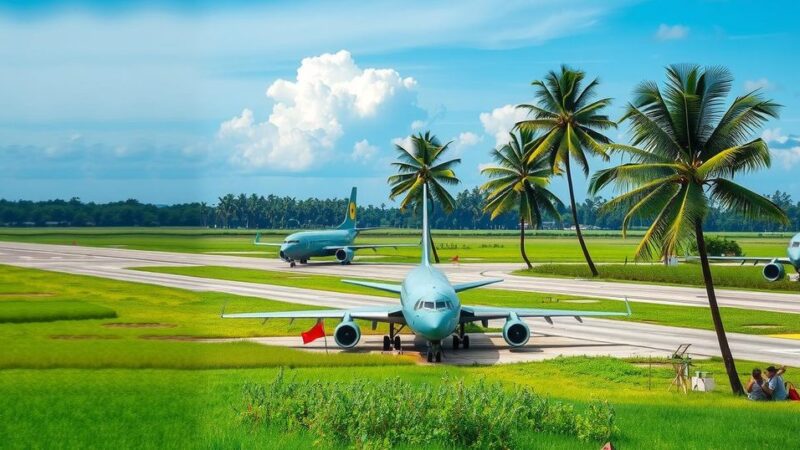Southeast Asian leaders gathered in Laos to discuss the ongoing humanitarian crisis in Myanmar and maritime disputes in the South China Sea. The summit involves global powers vying for influence in the region and includes participation from newly appointed leaders. Key discussions center on Myanmar’s civil conflict and territorial tensions exacerbated by China’s assertiveness, though experts foresee limited advancements in resolving these crises due to conflicting national interests.
Southeast Asian leaders convened in Vientiane, Laos, for an annual summit aimed at addressing the ongoing civil conflict in Myanmar as well as rising territorial tensions in the South China Sea. This year’s gathering of the Association of Southeast Asian Nations (ASEAN) includes discussions that will involve major global partners such as China, the United States, and Russia, reflecting the intense competition for influence within the region. The timing of the meeting may prompt dialogues concerning the escalating violence in the Middle East, although the direct repercussions have thus far been minimal for Southeast Asia. Although ASEAN has historically struggled to exert influence among its members, this forum has been a significant platform for engagement between superpowers and the region. All ten ASEAN member states—Indonesia, Thailand, Singapore, the Philippines, Vietnam, Malaysia, Myanmar, Cambodia, Brunei, and Laos—are participating, alongside discussions with additional partners including Japan, South Korea, India, and Australia, covering diverse topics encompassing economy, climate change, and energy matters. Several new national leaders are attending the summit for the first time. Paetongtarn Shinawatra of Thailand, who became the youngest leader in the bloc at age 38, will be a key figure. Singapore’s new Prime Minister Lawrence Wong will represent his nation following the lengthy tenure of Lee Hsien Loong. Vietnam’s representation will include Prime Minister Pham Minh Chinh, despite the recent appointment of President To Lam. Indonesia’s President Joko Widodo opted to send Vice President Ma’ruf Amin due to the impending transition of power. Significant attention will be devoted to the crisis in Myanmar, with calls for resolution emerging as critical. The situation escalated following the military’s ousting of the elected government of Aung San Suu Kyi in February 2021, leading to a humanitarian crisis exacerbated by ongoing violence. Myanmar’s junta has engaged in war against pro-democracy fighters and ethnic rebels, resulting in approximately 6,000 fatalities. While Myanmar plans to send its Foreign Ministry’s permanent secretary Aung Kyaw Moe to the assembly, indicating a thaw in relations, experts caution that it may reflect ASEAN’s waning resolve in addressing the matter. The summit is also anticipated to yield substantial discussions on territorial disputes in the South China Sea. ASEAN member states such as Vietnam, the Philippines, Malaysia, and Brunei contend with China’s expansive claims, which jeopardize their maritime boundaries, with increasing military assertiveness from Beijing. Tensions persist as incidents between Chinese and Filipino naval forces, as well as assaults on Vietnamese fishermen by the Chinese, continue to inflame regional sentiments, leading some member states to express frustration regarding ASEAN’s handling of these provocations. Despite high-level talks, the likelihood of concrete resolutions remains low as nations are inclined to prioritize relations with China over collective regional interests. Diplomatic scholar Muhammad Faizal Abdul Rahman highlighted this sentiment, noting that while members may focus on addressing disputes, their national interests will dominate over regional aspirations.
The article outlines the significant issues facing ASEAN leaders during their summit in Laos, primarily centering on the civil conflict in Myanmar and intricate territorial disputes in the South China Sea. The meeting occurs against a backdrop of increasing global competition for influence, particularly from major powers such as the United States and China. The summit serves as a crucial bilateral and multilateral platform for discussing regional stability, cooperation, and security agendas that resonate beyond Southeast Asia.
In summary, the ASEAN summit in Vientiane is poised to address critical and ongoing issues impacting not only Myanmar but the South China Sea territory disputes. The involvement of new leadership and the complexities of member states’ relationships with China underscore a difficult diplomatic landscape. While discussions are likely to occur, the prevailing national interests of member states may hinder significant progress in resolving regional crises, reflecting the intricate dynamics at play within ASEAN and its external partners.
Original Source: www.newsday.com






